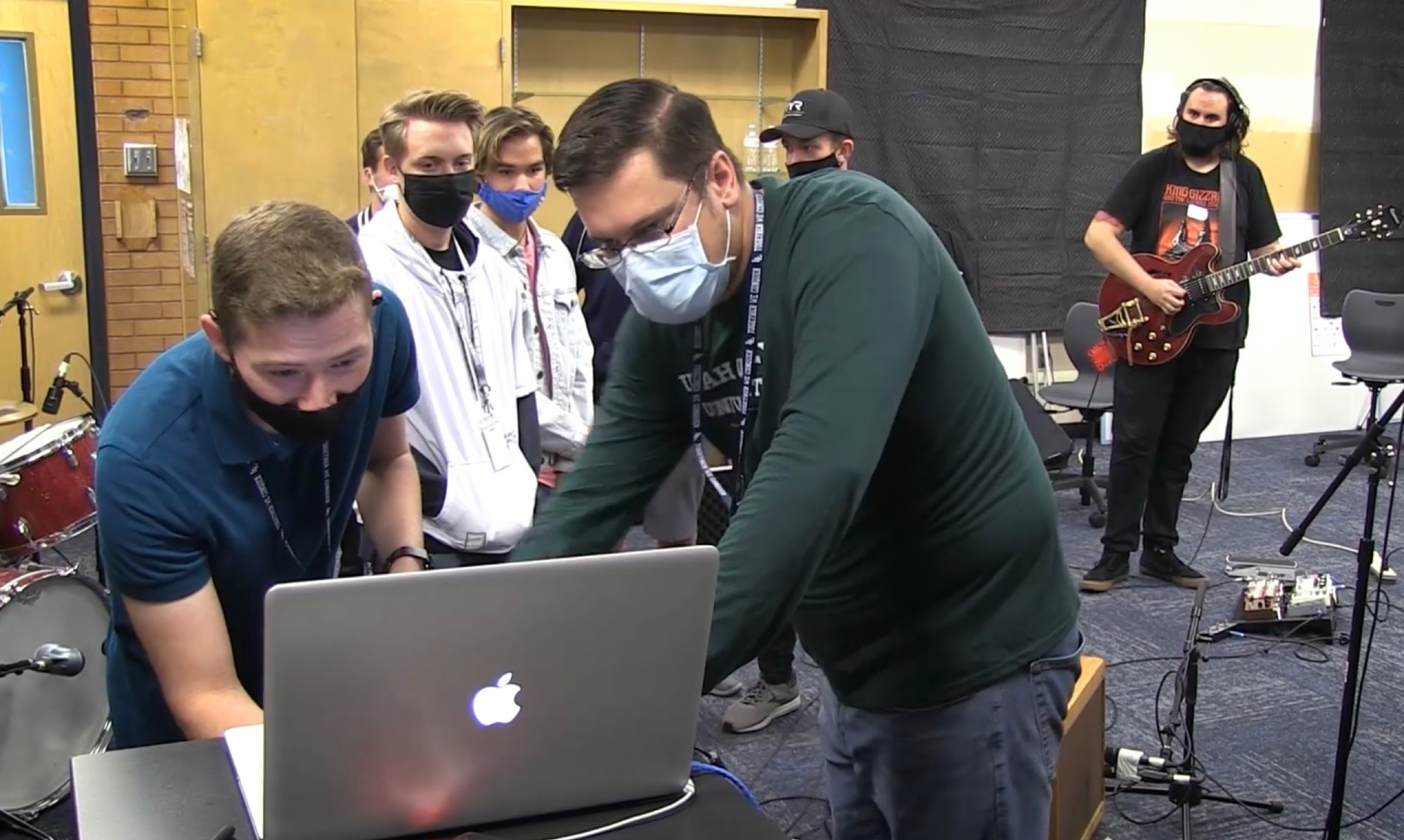

Jason Knoell, a recent graduate of Utah Valley University and a current instructor at Layton and Viewmont high schools, is teaching students curriculum that rocks — literally.
Knoell was hired as a digital audio essentials instructor at the two high schools last summer. Digital audio is the process of taking recorded sound and converting it into a digital format, such as MP3, that can be stored on a computer.
When creating his curriculum, Knoell wanted a class that would capture and hold the students’ attention, something that would spark their imaginations. His solution was simply genius — have the students help rock bands record albums.
Seventy-eight high school students at Layton and Viewmont signed up for the course that started 2020 fall semester. Little did they know that by participating they would help produce record albums for local bands.
“We just did a studio session with a local band, and that was super awesome fun because we learned how to apply techniques and all the equipment,” said Layton High School student Jacob Mumford.
Another student said, “Literally, as I was walking out of this classroom today, I was texting my friends, and they asked what I had been up to today? And I’m like, ‘I just recorded sound for a live band!’”
Knoell was in a perfect position to ask local rock bands for their help because he put himself through UVU by working as an engineer for several professional recording studios, and alongside the director of post-production at Skywalker Sound who produces an annual international Emmy show. The bands were happy to help.
“The hands-on learning is infinitely more beneficial than learning at home by yourself,” said Mike Lofgreen, drummer for the band Beach Death, who recorded with the students. “To get that hands-on experience early means that have a huge jumpstart in the industry.”
Knoell based his class on the theory, concepts, and math that go into audio production with the class being taught in a professional recording studio, which allows students the opportunity to set up the equipment, experiment with different techniques and the different sounds that they make, and learn why certain techniques are favored over others.
The students must apply the theory and math they have learned to ensure their results sound professional. This type of real-world experience is valuable and often not an option for students in high school.
“We are practicing what we learned over the past three weeks,” said Mumford. “Like how to mic things [instruments]. We use dynamic microphones and there are also condensers that use phantom power to record. We are learning where to exactly place them. It is just really fun the way he [Knoell] teaches. It is a really fun subject, really engaging.”
When creating the curriculum for his class, Knoell sought the advice of his former professors and mentors (now friends) in the digital audio program at UVU. He wanted engaging, hands-on, well-rounded curriculum, something that would capture the students’ attention and imagination.
Bryan Sansom, one of Knoell’s former UVU instructors in the digital media department, has been in contact with Knoell almost weekly since he accepted the teaching position, mentoring Knoell by providing insights and suggestions. “We care that students understand the theory, as well as how to use it,” Sansom said. “We strive to make sure our students have real-world skills to implement the theory they learn. That is our model in the digital audio program at UVU.”
According to Knoell, the teaching job at the high schools was his dream job. “When this position opened up it seemed natural,” he said. “It seemed like my dream come true to be here.”
The hands-on learning is like the engaged-learning model he experienced during his undergraduate work at UVU, which basically states that students learn faster and more effectively when institutions combine theory with hands-on experience.
A video produced by the communications team at the Davis School District titled “Real World Education That Rocks!,” (Layton and Viewmont high schools are in the district.) shows Knoell teaching his students in the recording studio. It documents the students producing professional grade recordings for local bands, including setting up the mics, condensers, and other sound equipment. Following the recordings, the students are enthusiastic and upbeat about the experience, sharing how they love the new course and the unique opportunities it provides them.
It is this passion and enthusiasm from students that makes Knoell’s job rewarding, and by teaching the upcoming generation, he is giving them a step up in the industry and a pathway to a degree in digital audio. Digital audio students at UVU graduate job-ready and experienced.
“Rather than just theory like most universities and colleges, or techniques like most conservatory-type institutions, we combine the two pillars [of engaged learning], add ample experiential work and career-readiness training, and turn out fully developed audio engineers,” said Arlen Card, associate professor of digital media at UVU.
The two-pillar engaged-learning approach to education is what sets UVU students apart from others as they enter the workforce with both theory and experience. Digital audio majors as well as other UVU majors graduate with a portfolio of projects that makes them attractive to industry and business.
High school students involved in the digital audio course taught by Knoell are building portfolios just as current UVU students are, showcasing the institution’s dedication to lifelong learning.
Rock on.
Information about UVU’s Digital Audio degree can be found at https://www.uvu.edu/digitalmedia/audio/.
This article was originally published in the Provo Daily Herald on Jan. 9, 2021.

